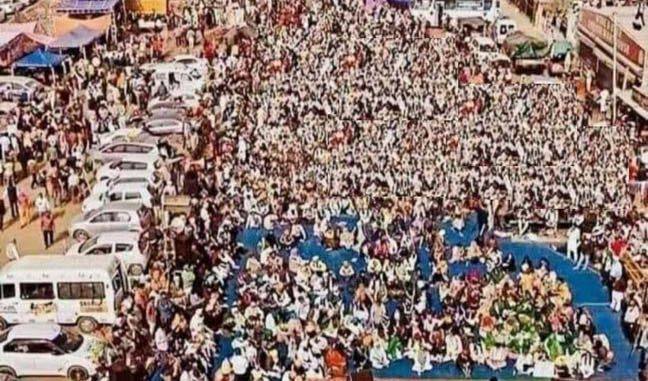

Is agitation heading for a solution?
Indian farmers in general and Punjab farmers, in particular, are on the threshold of a win. Their 100-day-old agitation has already tasted its first success when the Union Government, during the sixth round of talks, agreed to exclude farmers from the provisions of the Environment and Pollution Control Bill (burning of stubble) besides discarding the Electricity Bill 2020. Further negotiations are now pushed into New Year and January 4 has been fixed for the Union Ministers and the Farm leaders to sit together again to sort out the remaining major demands. The farmers are demanding a total repeal of all three Farm laws besides demanding legal sanctity to Minimum Support Price (MSP). Since the sixth round of talks were held in a cordial atmosphere, both sides are brimming with confidence hoping to bring to an end the longest, peaceful agitation by farmers in the country. Meanwhile, the farmers have also deferred its proposed tractor march to the union capital on the last day of the outgoing year.
This conflict between the Centre and the farmers, perhaps one of the biggest ever, both in volume and appeal, has been hawking the world focus. Not only human rights organizations and organizations of overseas Indians but also several world leaders have directly or indirectly supported the democratic and peaceful protest by farmers in support of their demands thus painting India as a nation offender in human rights violations.
While the Prime Minister and members of his Council of Ministers are showering praises upon the “revolutionary Farm laws that will usher in the biggest reforms in the agricultural sector”, the party expected to be beneficiary of these Farm laws – the farmers – is up in arms and demanding nothing less than repeal of these “Draconian” or “Black laws”.
The farmers have refused to withdraw their demand for the repeal of three farm laws though the Centre through initial rounds of talks agreed to make some amendments in the “controversial laws. Their argument is that the basic idea behind the laws is flawed and that mere amendments won’t change that.
It is not Punjab which is angry. It is the NDA Government at the center that has let its anger loose in the guise of Farm Reforms, says Dr AJ Singh, an octogenarian economist. Adding fuel to the fire are those who are accusing peaceful farmers of being separatists, Khalistanis or antisocial elements working at the behest of the neighboring Pakistan and China? It is a pity that the masses cannot protest against the State unless they are ready to be identified as anti-nationals, he adds. In the first 35 days of the second phase of the agitation – sit in dharna on the outskirts of the Union capital – 50 farmers have lost their lives either due to hostile weather conditions or in road accidents while travelling to and fro as a part of the agitation.
Then there was Baba Ram Singh of Nanaksar who ended his life to express his solidarity with the agitating farmers. “It is unbearable for me to see the plight of the farmers and the apathy of the Union Government,” he said in his suicide note.
An advocate, Amarjit Singh, held Prime Minister Narenda Modi responsible for the plight of farmers during the agitation before consuming some poisonous substance to end his life. He left behind one-page suicide note in English.
The protesting farmers have remained peaceful.
Though the agitation may have nothing to do with Sikhs or Sikhism, yet the larger participation of Punjab farmers, who are mostly Sikhs, and the wholehearted support from various organizations, including the Shiromani Gurdwara Parbandhak Committee, the Delhi Sikh Gurdwara Management Committee, gave an opportunity to a strong vocal section of the ruling Bharatiya Janata Party to dub the “peaceful agitation” as “separatists”, “Khalistanis”, Naxalites” or even “Maoists”. Even Union Ministers were among those who heaped these allegations on peaceful demonstrators.
It may be a mere coincidence that the first week of June continues to attain notoriety. Starting with the Operation Bluestar in 1984, it extended its wings to the worst ever State terrorism witnessed at Beijing’s Tiananmen Square (1989) where hundreds of thousands of students and their supporters were either eliminated or de-capacitated. And then comes June 2020, when the NDA government in India promulgated three Farm Laws that had farmers throughout the country in general and Punjab in particular on their toes.
While the Prime Minister and members of his Council of Ministers are showering praises upon the “revolutionary Farm laws that will usher in the biggest reforms in the agricultural sector”, the party expected to be beneficiary of these Farm laws – the farmers – is up in arms and demanding nothing less than repeal of these “Draconian” or “Black laws”.
This conflict between the Centre and the farmers, perhaps one of the biggest ever, both in volume and appeal, has been hawking the world focus. Not only human rights organizations and organizations of overseas Indians but also several world leaders have directly or indirectly supported the democratic and peaceful protest by farmers in support of their demands thus painting India as a nation offender in human rights violations.
On Sunday (December 20), Prime Minister Narendra Modi surprised everyone by visiting a historic Sikh shrine in New Delhi. He visited Gurdwara Rakab Ganj to offer prayers probably with an intention to assuage the hurt feelings of the Sikh community over the unsavory comments made by his party leaders during the ongoing stir.The visit, as many thought, was to signal a possible next round of talks in the coming week to end the farmers’ agitation. And meetings resumed on December 30.
Earlier in the day (December 20) prayer meetings were held to pay obeisance to all those farmers who laid down their lives during the agitation.
There is a need to understand the psyche of Punjab farmers. If one looks back at times when the country was under the British regime, whenever the farmers took to streets in peaceful protests, they invariably forced the might of the British Empire to its knee, be it the be the “Pagri Sambhal Jatta” Morcha or the liberation of Sikh gurdwaras from the State sponsored “Mahants”.
The post-Independence history, too, is punctuated with examples where farmers agitated peacefully and forced the State to concede their demands. Memories would still be fresh in the minds of those who witnessed the week-long siege of Punjab Raj Bhavan in 1984.
Exactly like the current agitation when farmers started their peaceful protests in June after the three controversial Farm laws were promulgated, farmers had successfully conducted a 14-month agitation in various parts of the State before moving to Chandigarh to gherao of Punjab Raj Bhavan, the then center of power. At that time, the issue was withdrawal of a hike in power tariff.
Even at that time hundreds of tractor-trailers rolled into the City Beautiful carrying essential supplies, including ration, fuel, and beddings to make the posh area around Punjab Raj Bhavan their new habitat. They did set up their kitchens and a flawless siege around Punjab Raj Bhavan from March 12 to 18 making sure that no one left or entered the official residence of the then Administrator of Punjab and Chandigarh, Mr. BD Pande, a retired bureaucrat. Since the militancy was at its peak, there was a heavy deployment of security forces not only in Punjab but also in Chandigarh and still hundreds of thousands of farmers peacefully came in, initially as unwelcome guests, but later left as adorable friends. There was an overwhelming support from all sections that helped the agitation to end successfully. This time, the support is much larger, warmer and determined as hundreds of thousands of supporters are reaching out to agitating farmers in and around Delhi borders not only with cooked food, blankets, medicines, dairy products, fruit, books, fuel, including diesel for tractors, besides emergency lights, firefighting equipment, first aid kits and mobile lavatories, but also extending their support.
They have gained in strength and stature as experienced leaders when farers from other states, including Haryana, Uttar Pradesh, Madhya Pradesh, Rajasthan, Andhra Pradesh, Bengal and other States have joined them to set aside criticism that it was the agitation of farmers of Punjab alone.
The 1984 siege of Punjab Raj Bhavan threw up two MPs – Mr. Sharad Joshi (Maharashtra) and Mr. Bhupinder Singh Mann (Punjab) – who both were nominated to Rajya Sabha. However, most other farm leaders and their unions have continued to remain apolitical. There have been some exceptions when one faction or the other of the Bharatiya Kisan Union has lent support to one party or the other. During farmers’ agitations, neither any political party nor any leader is allowed to share the dais.Interestingly, farmers, true to their rich heritage and golden history of strongest peaceful protestors have remained calm and organized in spite of provocative statements and actions of some sections, mostly owing allegiance to the ruling party.
Farmers have been arguing that agriculture is not a profession but a way of living and allowing its takeover by the corporate would sound its death knell. They maintain that if the laws have been made for the benefit then why they were not consulted or taken in confidence while drafting them.
Their apprehension is that the corporate sector will not only exploit them but also grab their precious land holdings on one pretext or the other, primarily in the name of contract farming. Earlier experiments in contract farming, they maintain, were disastrous. There are hardly any instances where the corporate helped in ameliorating the lot of poor and needy.
The NDA government, however, insists on making amendments to the irritating or unacceptable clauses of the new Farm laws.
The Farm Laws
- Farmers (Empowerment and Protection) Agreement on Price Assurance and Farm Service Act 2020 (Promulgated on June 5, 2020, as an Ordinance and approved by Lok Sabha on September 17, Rajya Sabha on September 20, and the President of India on September 27.
- Farmers Produce Trade Commerce(Promotion and Facilitation) Act, 2020
(To deal with the Agricultural Produce Market Committee (APMC)
- Essential Commodities (Amendment) Act, 2020.
Provisions to make laws are governed by the lists under the Constitution. There are three lists:
- Union List – 97
- State List – 66
- Concurrent List – 47
Repealing and Amendment Act, 2017
Under this Act passed in 2017, 104 of the existing laws were repealed. Besides 3 Sections of the Taxation Laws, too, were partially repealed.
In fact the Union Government had identified 1877 Laws to be redundant to be repealed.
This Act was approved by Lok Sabha on December 9, 2017 and by Rajya Sabha on December 28, 2017. On January 5, 2018, the President of India signed this Bill to make it a Law.
Let me compare three major agitations by farmers in Punjab:
- In 1907, when the British tried to introduce three new laws in the agricultural sector, it met with serious opposition from Punjab farmers. As a retaliation to these laws, that were termed anti-farmer”, a people’s movement started in the then undivided Punjab. Its impact was much more in Western Punjab, now in Pakistan, than rest of the State.
The laws were introduced to control or legalize land holdings of the farmers besides regulating use of canal and river water for irrigation.
A song – Pagri Sambhal Oye Jatta (O tiller of land, take care of your turban) – written by Lala Banqe Dyal went viral and was virtually on everybody’s lips. It was first sung publicly in Lyallpur, now Faisalabad. And the “Pagri Sambhal Jatta agitation, mostly peaceful, that followed ultimately forced the British rulers first to suggest some amendments but later agreed to withdraw all the three laws. Among the leaders that played a lead role in the agitation were Sardar Kishan Singh and Sardar Ajit Singh, father and uncle of Shaheed Bhagat Singh. Another leader of farmers was Mr. Ghasita Ram.
2.One of the major agitations in post-independence India, Punjab farmers fought the “unprecedented” hike in power tariff. Describing power as the most important ingredient in farm production, hundreds of thousands of farmers owing allegiance to the Bhartiya Kisan Union (BKU), started peaceful protests all over the State. After 14 months of these protests and demonstrations, they decided to move to Chandigarh to lay a siege to Punjab Raj Bhavan. Reeling under militancy, the elected Government in the State was suspended and the Central Rule or President’s rule was introduced in the State. All the legislative and administrative powers were vested in the Governor, who at that time was a retired bureaucrat, Mr. B.D. Pande. A couple of retired civil and defense officials were appointed his Advisers to help him in running the Administration besides controlling militancy.
Intriguingly, this picketing of Punjab Raj Bhavan happened just 10 weeks before the “controversial Operation Bluestar”
Regardless of the State being under Central control with extra-Constitutional powers vested in security forces, including police and paramilitary, thousands of farmers carrying their essential supplies for several weeks descended on Chandigarh, the City Beautiful. They successfully laid a siege to Punjab Raj Bhavan in the posh northern Sectors to the great anguish of top civil and police functionaries besides members of the higher judicial services living there. The siege was complete and continued for a week. Farmers decided to lift the siege only after the State agreed to concede most of the demands of the “peaceful guests of the city. Interestingly, the entire agitation passed off peacefully though farmers had not only blocked Punjab Raj Bhavan but also the elitist Chandigarh Golf Club and the adjoining Haryana Raj Bhavan. Even after 36 years, many in Chandigarh still remember those “unwelcome” guests who later became friendly and adorable.
- 3. The latest agitation by farmers was in reaction to three Ordinances the NDA Government promulgated on June 5, 2020, to clear way for the corporate and private houses to invade the farm sector in a big way. The Ordinances were converted into what are described as Farm Laws in September with both the Houses of Parliament and the President putting their stamp on them to the great chagrin of farmers of India in general and Punjab in particular.
The first reaction to the new laws was the resignation of Mrs. Harsimrat Kaur Badal, wife of Shiromani Akali Dal chief Sukhbir Singh Badal, from the Union Council of Ministers followed by withdrawal of SAD from its age-old alliance with the Bharatiya Janata Party (BJP) thus ending its membership of NDA.
Staying clear of all political parties, thirty organizations of farmers started an agitation demanding immediate repeal of all three laws. Initially, the rail tracks, toll plazas and major outlets of two leading corporate – Reliance and Adani- were blocked before the peaceful protestors decided to move to the Union capital to continue their agitation there. Starting in the first week of November, hundreds and thousands of farmers in their self-reliant tractor trailers headed for Delhi. On the way, they met with serious and stiff resistance from the BJP ruled Haryana State as tear gas shells, water cannon, huge boulders and all possible means were used to stop their progress. But determined farmers were too strong for all these barricades and stopped only at the Delhi borders that they decided to make their battlefield.
After blocking all possible entries to Delhi from Haryana, the agitating farmers then moved to block the Delhi-Jaipur highway in Rewari district in Haryana. The farmers at the blockade in Rewari came mainly from Gujarat and Maharashtra along with those from Rajasthan and Haryana. They were joined by Medha Patkar of the Narmada Bachao Andolan and Yogendra Yadav of Swaraj India.
The farmers have refused to withdraw their demand for the repeal of three farm laws though the Centre through initial rounds of talks agreed to make some amendments in the “controversial laws. Their argument is that the basic idea behind the laws is flawed and that mere amendments won’t change that.
(The author is a senior journalist, currently Executive Editor at PTC TV. He can be reached at prabhjot416@gmail.com )





Be the first to comment